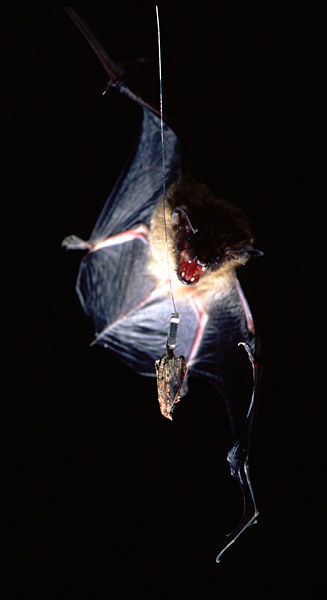A new study has shown that Bats might stay quiet and listen to each other when they are out hunting for their dinner.
That's according to Cynthia Moss and her colleagues from the University of Maryland in the states who have been studying big brown bats in captivity, and tracking how their ultrasonic signals changes when the group pursues their flying insect prey.
Nocturnal bats use echolocation to forage for prey and safely navigate around in the pitch dark. They emit very high pitched squeaks and measure how long it takes to bounce back to them, and from that they can work out where objects are around them.
 And of course most of the sounds bats make are inaudible to human ears - we can only pick up sounds of between around 20 hertz and 20 kilhertz, while bats can chirp at over 100 kilhertz.
And of course most of the sounds bats make are inaudible to human ears - we can only pick up sounds of between around 20 hertz and 20 kilhertz, while bats can chirp at over 100 kilhertz.
What Moss and her team discovered was that at certain times some of the bats turned off their sonar and went totally quiet for a while - only for around 800 milliseconds, which might not sound like much but is in fact a long time in the fast-paced life of a bat.
For now we can't be sure why the bats are going quiet like this, but it is possible that one bat stops making sounds and eavesdrops on the sounds of another bat, perhaps to help prevent crossed signals. You can imagine when they were lots of bats feeding in a similar area it would be very easy for all their signals to get mixed up and confused. If that is what the bats are doing then this would be evidence of a type of cooperation that has long been suspected but never proven in these flying mammals.









Comments
Add a comment